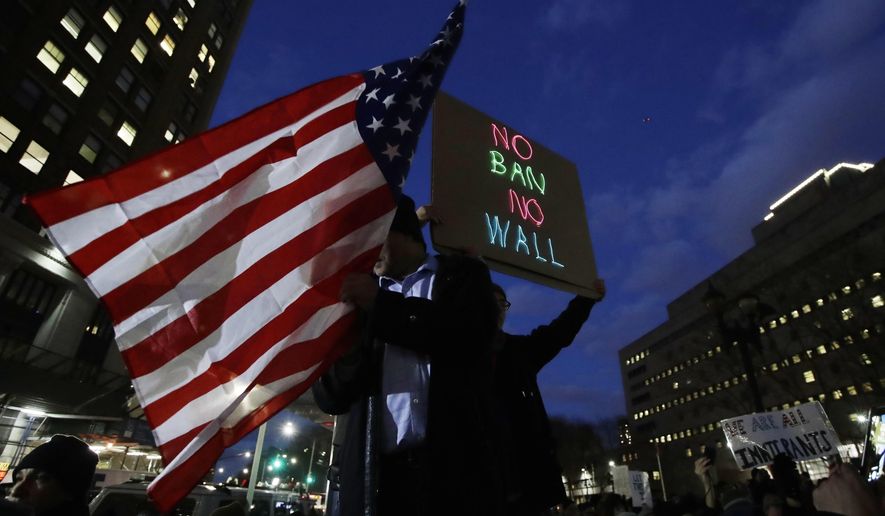A federal judge halted the deportation of hundreds of illegal immigrants from Iraq, dealing at least a tentative blow to the Trump administration in a case that could signal even greater judicial intrusion into immigration policy.
In a case resounding with major implications for big separation-of-powers questions, District Judge Mark A. Goldsmith said federal courts have the power to provide a final appeal in immigration cases, even though Congress had tried to limit their powers and give the executive branch full control of deportations.
Judge Goldsmith overruled Congress and said he had to step in to save the Iraqis from immediate deportation, saying otherwise they risked “death, torture or other grave persecution” back home.
“Under the law, the federal district courts are generally the ’first responders’ when rights guaranteed by the Constitution require protection,” the judge wrote. “In fulfillment of that mission, this Court concludes that it has jurisdiction in this case to preserve the fundamental right of habeas corpus and the duty to do so.”
His decision, though, leaves murderers, rapists and other serious criminals in the U.S. — for now.
It’s the latest move by federal judges to block the Trump administration’s immigration plans. A federal judge in Georgia ruled earlier this year that Homeland Security couldn’t unilaterally strip a Dreamer of her status under the Deferred Action for Childhood Arrivals program, the 2012 deportation amnesty for young adult illegal immigrant. And a judge in California has limited the administration’s sanctuary city crackdown.
Activists say they’re increasingly looking to the courts for protection.
A new class action lawsuit filed Wednesday asks a judge to force border officers to stop stymying migrants who show up at the border claiming asylum. For months, advocates had been complaining that Customs and Border Protection officers at the ports of entry were hostile to asylum-seekers who appeared at ports of entry without permission, but with horror stories of conditions they faced back home.
“CBP’s unlawful practice of turning asylum seekers away from POEs is forcing asylum seekers, including Class Plaintiffs, to return to Mexico and other countries where they remain susceptible to serious harm such as kidnapping, rape, trafficking, torture or even death,” says the lawsuit, filed in California.
The Iraqi lawsuit, filed in Michigan, is also a class action.
Homeland Security had arrested several hundred Iraqis in May and June, and agents had their eye on 1,000 more who have been ordered deported but who had never been sent home because the Iraqi government had refused to cooperate in their removal.
That all changed earlier this year when Iraq, in order to earn its way off President Trump’s travel ban policy, agreed to start taking back its deportees — freeing agents to go after the backlog that had built up over the years.
Many of the Iraqis are Chaldeans, a sect of Catholics that are persecuted in their home country. Their numbers have shrunk dramatically as they’ve fled first the violence of the post-U.S. invasion, and more recently the brutality of the Islamic State.
The Chaldeans didn’t dispute that they’d been ordered deported, but argued actually going home could mean a death sentence.
In court, the Trump administration had argued that district court judges didn’t have power to review deportations, saying the law was quite clear on that point.
Judge Goldsmith agreed that the law precluded his review — but said that this violated the U.S. Constitution, and he said he would step in anyway to protect rights.
The judge said making matters worse for the government was its decision to target more than 1,400 Iraqis at once. He said that stretched the ability of immigration lawyers to help their defense.
Iraqis say they want a chance to reargue their deportation cases now, given the changing circumstances in their home country. They say that no matter what the criminal charges, the immigrants have completed their sentences in the U.S. justice system and sending them back home to potential death is unfair.
Some of the Iraqis have been under deportation orders for more than 30 years.
The Trump administration says that if the Iraqis had wanted to revisit their cases, they could have filed a petition at any time in recent years, and they shouldn’t have waited until they were finally picked up for deportation.
Judge Goldsmith, though, said it made no sense for the migrants to pay what could amount to tens of thousands of dollars to reopen their cases when Iraq wasn’t taking back deportees, and there was no real fear of being kicked out.
• Stephen Dinan can be reached at sdinan@washingtontimes.com.




Please read our comment policy before commenting.